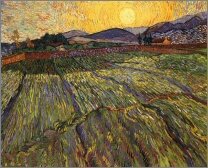Paganism a Nature Religion?
 A response to this post by Sojourner at A Pagan Sojourn; Is Paganism A Nature Religion?
A response to this post by Sojourner at A Pagan Sojourn; Is Paganism A Nature Religion?And this comment by one of the visitors:
Deborah said...
I'm not sure that Paganism is a religion at all. It's an umbrella term for a disparate group of religions.
Many Pagan religions ARE nature-based. If you are following seasonal cycles, if your holidays are marked by natural rather than calendrical events (i.e. the sun, the moon, the crops) then that's nature-based.
Paganism is a religion to be sure. Firstly, the "ism" clarifies it as a belief system. Secondly, it is an umbrella term no different than Protestant or Christian. I'm sure we can all agree that there are many religious traditions that fall under those umbrellas but that doesn't mean the umbrellas themselves are not religions.
Web definitions of Religion
As far as Paganism being nature based. I think it must be. Specifically because, in my opinion, one of the things many Pagans tend to agree on is the idea of Oneness and Divinity within the self. If all things are truly one than all things are sacred - especially the natural world which is the one thing we can say is truly Goddess given.
You don't have to know the latin name for every plant in you local forest. You don't have to grow your own food and harvest it at the perfect time according to the sun, moon, and stars. All you have to do is observe a sunset or listen to the sound the trees make as they dance in the wind. It's really very simple. If you're concerned about being more involved in nature but feel that you live in a way that makes that difficult (i.e. the city, an apartment, etc.) try some of these things:
- Get a pet. Communing with nature doesn't specifically have to mean the plant world.
- If you have no yard to grow plants in try using containers. Houseplants are wonderful for their energy and their decorative aspects. Tomatoes grow fabulously in a big pot on a patio or balcony. I grew roses, herbs, and various annuals every year on a balcony that was three stories up.
- Use purchased dried herbs to make teas, oils, and other nature-based concoctions.
- Give thanks for all that you consume. Whether it's food, water, or air - be grateful and thankful for all that nature provides.
- Take note of your surroundings as you walk into work, school, and basically go about your day. Chances are there are all sorts of plants lining the streets of your town/city. Take a moment to take in their scent and touch their leaves or petals.
- Create your own natural world through meditation and visit it often.
- Look within. See that you are of nature and you are divine.
The more you practice some of the small daily things the more you will begin to notice that nature is not living in a forest somewhere on a mountain top full of mysterious latin named plant folk. Instead, it is everywhere and everything around you.
Labels: Modern Paganism

 Burning the Wicker Man
Burning the Wicker Man







3 Comments:
Good response. I was going to address this same issue in my next post because the term 'paganism' does imply that it is a religion based on useage of it's root word.
I am a follower of the Religio Romana, or religion of ancient Rome. Festivals are often season-related, but I have a sense that they became more deity-oriented over time, and less nature-oriented. In other words, the focus of religious practice was originally the earth, water, crops, etc. and the deities who were connected to these things.
At some point the focus shifted to the deities themselves, their earth-related aspects becoming a part of who they were, but not always the "reason" for who they were or for making offerings and supplications to them. Still Pagan though!
Unless I'm reading it wrong, Sojourner seems to be saying that an indication that paganism is a nature religion can be based on the root meaning of the word "pagan" itself. "Pagan" is from the Latin "paganus", meaning country dweller. Christians used it to denote those who lived away from the cities where there faith was first spreadm and who hadn't yet heard the of their Christ or been converted. The Romans used it too, but to mean an uneducated or backwards "hick", "bumpkin", "rube", etc. It was derogatory in this sense, and really had no other connection to "nature" in its meaning.
Post a Comment
Links to this post:
Create a Link
<< Home